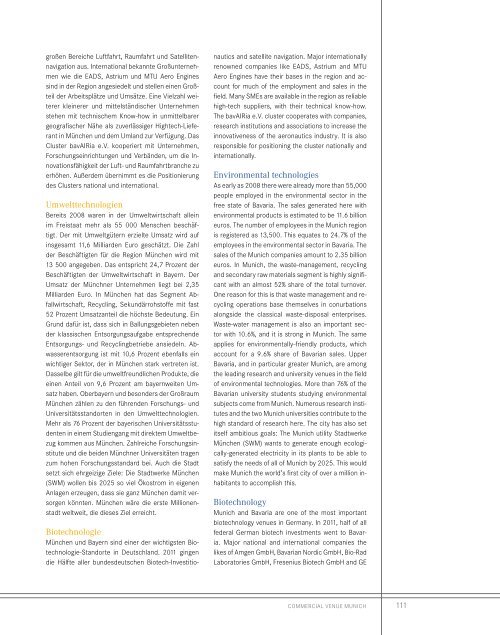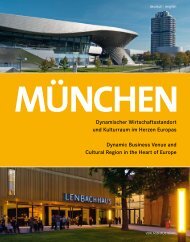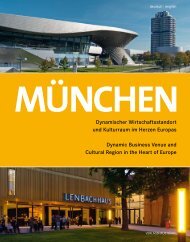Buch_Muenchen
You also want an ePaper? Increase the reach of your titles
YUMPU automatically turns print PDFs into web optimized ePapers that Google loves.
großen Bereiche Luftfahrt, Raumfahrt und Satellitennavigation<br />
aus. International bekannte Großunternehmen<br />
wie die EADS, Astrium und MTU Aero Engines<br />
sind in der Region angesiedelt und stellen einen Großteil<br />
der Arbeitsplätze und Umsätze. Eine Vielzahl weiterer<br />
kleinerer und mittelständischer Unternehmen<br />
stehen mit technischem Know-how in unmittelbarer<br />
geografischer Nähe als zuverlässiger Hightech-Lieferant<br />
in München und dem Umland zur Verfügung. Das<br />
Cluster bavAIRia e.V. kooperiert mit Unternehmen,<br />
Forschungseinrichtungen und Verbänden, um die Innovationsfähigkeit<br />
der Luft- und Raumfahrtbranche zu<br />
erhöhen. Außerdem übernimmt es die Positionierung<br />
des Clusters national und international.<br />
Umwelttechnologien<br />
Bereits 2008 waren in der Umweltwirtschaft allein<br />
im Freistaat mehr als 55 000 Menschen beschäftigt.<br />
Der mit Umweltgütern erzielte Umsatz wird auf<br />
insgesamt 11,6 Milliarden Euro geschätzt. Die Zahl<br />
der Beschäftigten für die Region München wird mit<br />
13 500 angegeben. Das entspricht 24,7 Prozent der<br />
Beschäftigten der Umweltwirtschaft in Bayern. Der<br />
Umsatz der Münchner Unternehmen liegt bei 2,35<br />
Milliarden Euro. In München hat das Segment Abfallwirtschaft,<br />
Recycling, Sekundärrohstoffe mit fast<br />
52 Prozent Umsatzanteil die höchste Bedeutung. Ein<br />
Grund dafür ist, dass sich in Ballungsgebieten neben<br />
der klassischen Entsorgungsaufgabe entsprechende<br />
Entsorgungs- und Recyclingbetriebe ansiedeln. Abwasserentsorgung<br />
ist mit 10,6 Prozent ebenfalls ein<br />
wichtiger Sektor, der in München stark vertreten ist.<br />
Dasselbe gilt für die umweltfreundlichen Produkte, die<br />
einen Anteil von 9,6 Prozent am bayernweiten Umsatz<br />
haben. Oberbayern und besonders der Großraum<br />
München zählen zu den führenden Forschungs- und<br />
Universitätsstandorten in den Umwelttechnologien.<br />
Mehr als 76 Prozent der bayerischen Universitätsstudenten<br />
in einem Studiengang mit direktem Umweltbezug<br />
kommen aus München. Zahlreiche Forschungsinstitute<br />
und die beiden Münchner Universitäten tragen<br />
zum hohen Forschungsstandard bei. Auch die Stadt<br />
setzt sich ehrgeizige Ziele: Die Stadtwerke München<br />
(SWM) wollen bis 2025 so viel Ökostrom in eigenen<br />
Anlagen erzeugen, dass sie ganz München damit versorgen<br />
könnten. München wäre die erste Millionenstadt<br />
weltweit, die dieses Ziel erreicht.<br />
Biotechnologie<br />
München und Bayern sind einer der wichtigsten Biotechnologie-Standorte<br />
in Deutschland. 2011 gingen<br />
die Hälfte aller bundesdeutschen Biotech-Investitionautics<br />
and satellite navigation. Major internationally<br />
renowned companies like EADS, Astrium and MTU<br />
Aero Engines have their bases in the region and account<br />
for much of the employment and sales in the<br />
field. Many SMEs are available in the region as reliable<br />
high-tech suppliers, with their technical know-how.<br />
The bavAIRia e.V. cluster cooperates with companies,<br />
research institutions and associations to increase the<br />
innovativeness of the aeronautics industry. It is also<br />
responsible for positioning the cluster nationally and<br />
internationally.<br />
Environmental technologies<br />
As early as 2008 there were already more than 55,000<br />
people employed in the environmental sector in the<br />
free state of Bavaria. The sales generated here with<br />
environmental products is estimated to be 11.6 billion<br />
euros. The number of employees in the Munich region<br />
is registered as 13,500. This equates to 24.7% of the<br />
employees in the environmental sector in Bavaria. The<br />
sales of the Munich companies amount to 2.35 billion<br />
euros. In Munich, the waste-management, recycling<br />
and secondary raw materials segment is highly significant<br />
with an almost 52% share of the total turnover.<br />
One reason for this is that waste management and recycling<br />
operations base themselves in conurbations<br />
alongside the classical waste-disposal enterprises.<br />
Waste-water management is also an important sector<br />
with 10.6%, and it is strong in Munich. The same<br />
applies for environmentally-friendly products, which<br />
account for a 9.6% share of Bavarian sales. Upper<br />
Bavaria, and in particular greater Munich, are among<br />
the leading research and university venues in the field<br />
of environmental technologies. More than 76% of the<br />
Bavarian university students studying environmental<br />
subjects come from Munich. Numerous research institutes<br />
and the two Munich universities contribute to the<br />
high standard of research here. The city has also set<br />
itself ambitious goals: The Munich utility Stadtwerke<br />
München (SWM) wants to generate enough ecologically-generated<br />
electricity in its plants to be able to<br />
satisfy the needs of all of Munich by 2025. This would<br />
make Munich the world’s first city of over a million inhabitants<br />
to accomplish this.<br />
Biotechnology<br />
Munich and Bavaria are one of the most important<br />
biotechnology venues in Germany. In 2011, half of all<br />
federal German biotech investments went to Bavaria.<br />
Major national and international companies the<br />
likes of Amgen GmbH, Bavarian Nordic GmbH, Bio-Rad<br />
Laboratories GmbH, Fresenius Biotech GmbH and GE<br />
Commercial Venue Munich 111




